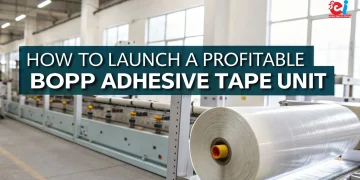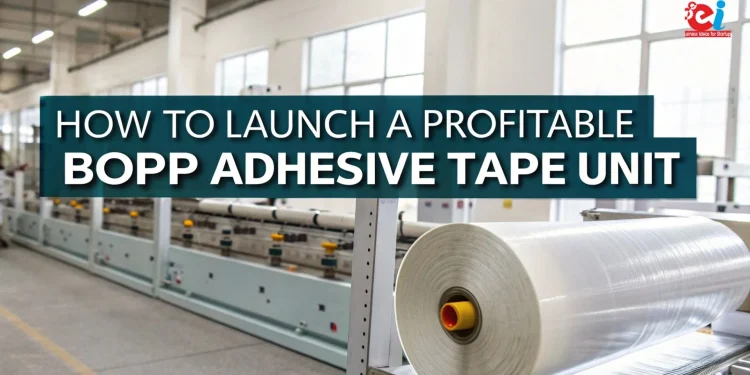There are a number of factors driving the evolution of the modern-day packaging industry such as security, economy, and efficient sealing. One product that has effectively changed the landscape of this industry is BOPP adhesive tape. BOPP tapes are used everywhere, from online retail packaging and courier services to industrial applications and FMCG product handling. For those who are looking to invest reasonably and start a scalable business, setting up a BOPP adhesive tape manufacturing unit is an unmatched opportunity.
BOPP tapes are known for their superior adhesion, clear appearance, tear resistance, and adaptability to branding and printing. Not only do BOPP tapes serve the functional requirement of sealing, they also promote brand visibility and keep products safe. BOPP tapes have essentially become the face of modern packaging and provide marketing value and utility. Be it product branding during transit or sealing of cartons in logistics hubs, BOPP tapes serve multiple functions.
You can enjoy great profit margins by starting a BOPP adhesive tape manufacturing unit while simultaneously placing yourself right in the middle of the booming e-commerce, logistics, and warehousing ecosystem. Now, we will discuss step by step how you can execute this idea and turn it into a successful manufacturing venture.
Everything You Need to Know About BOPP Adhesive Tapes
BOPP, short for Biaxially Oriented Polypropylene, a brand of thermoplastic polymer, bending with both the mechanical and optical properties of a material, has several applications. Film BOPP is manufactured through two methods of stretching, that is, in machine way and crosswise. This enhances its clarity as well as stiffness and resistance. BOPP film, coated with an easily frictioned acrylic adhesive, is transformed into a tape that is not only durable but also water resistant and highly versatile, making it suitable for high-volume packaging.
BOPP tapes, strong in nature, are able to seal cardboard boxes, packages and even irregular-shaped containers. Furthermore, their gloss, printability and branding capability allows for BOPP tapes to be a preferred choice. Businesses leverage BOPP branded tapes for identity promotion while products are in transit. BOPP tapes have industrial usages where moisture resistance, flexibility as well as thermal tolerance are required.
Use cases of BOPP tapes range from orders placed on Amazon or Flipkart to export packaging. They are in constant demand in various sectors. These include: hospitals, automobile industries, chemical companies, logistics warehouses, book sellers, and even government offices. The universal demand keeps them in high demand ensuring growth opportunities.
Market Trends and Future Prospects
India’s BOPP tape market is already worth more than ₹3000 crores and is expected to expand over the next five years at a CAGR of more than 8%. Some of the key factors driving this growth are the boom in e-commerce, organized retail, increase in logistics and supply chain activity, and growing exports.
What further enhances the prospects of the business is the ability to capture various market segments. BOPP adhesive tapes are no longer brown and transparent; they now come in various colors, widths, and even printed options tailored to specific businesses. A shift towards packaging that is sustainable and recyclable also presents new opportunities for innovative eco-friendly BOPP tape alternatives.
From a global perspective, India possesses basic raw materials, infrastructure, skilled personnel, and even a readiness to export which provides a competitive edge. Establishing a manufacturing unit today grants access to both domestic and export markets without substantial infrastructural or logistical investment.
Manufacturing Process Overview
BOPP adhesive tape’s manufacturing process consists of three main steps: film coating, slitting, and finally packaging. It is worth exploring these systematically.
Everything begins with a roll of BOPP film (jumbo-sized). The surface of the film is treated with a corona discharge, allowing better adhesion to the surface. The next step involves passing the film through the coating machine, where a formulated acrylic adhesive is applied onto one side of the film. To guarantee an uniform coverage of adhesive, the film is coated using a gravure or reverse roll coater. Additionally, the film is dried in a multi-zone drying chamber to remove any moisture and solvent, maintaining the and even layer of adhesive.
After ensuring the adhesive is completely dried, the films are rolled into jumbo rolls. The slitting and rewinding machine automatically slices the jumbo roll into smaller, standard-sized tape rolls (generally 1”, 2”, or 3” wide, and 50 to 100 meters long). The rolls are subsequently checked, packed, labeled, and shipped out for wholesale or retail.
A dedicated logo printing unit can be added to the production line to facilitate private labeling, allowing companies to print custom logos, messages, or warning labels on the tape before slitting. Core cutters, shrink-wrap machines, and labeling stations can fully automate the final packaging process.
Machinery Required for Production
The following machines and equipment are fundamental for establishing a BOPP adhesive tape manufacturing plant:
- BOPP Film Coating Machine
This is the main machine responsible for the application of adhesive on the film which consists of rewinder, drying chamber, coating station, and core setter. - Slitting and Rewinding Machine
The machine slices jumbo rolls into smaller retail-size rolls of tape. It has adjustable tension controls and variable width settings. - Adhesive Mixing and Storage Tank
Used to store products, the crochet emulsion and other potent factors which needs to blended, a jacketed tank with agitator BOPP roll ensures uniform mixing. - Air Compressors and Chillers
Required in maintaining temperature sensitive processes ad for exercising a lifting device. - Core Cutter Machine
For cutting cardboard of PVC cores on which tapes are wound. - Shrink Wrap Packaging Machine
Used for bundling and wrapping completed rolls in a warm plastic wrap. - Labeling Unit (Optional)
Available for adding barcode or brand labels for monitoring and retail sales.
Depending on your production scale, these machines can be procured from local Indian vendors or international suppliers with fully automatic and semi-automatic options available.
Related: Growth Opportunities in Production of Bopp Adhesive Tapes
Raw Materials and Chemical Composition
These represent the main following materials required including:
- BOPP Film Rolls: Normally 1000mm to 1500mm wide, thick 23–30 microns. Furthermore, it requires treatment from corona discharge before use.
- Acrylic Adhesive: Emulsion of water or solvent containing tack, peel strength, and bond with surfaces of cardboard.
- Optional Release Coating: Permits easy unwinding and prevents adhesive residue during storage periods.
- Paper/PVC Cores: Used as a shaft for finishing tape rolls.
- Printing or Customized BOPP Tapes: Are manufactured using flexo or UV curable inks which fall under Ink and Printing Chemicals.
Utilizing trustworthy suppliers for chemicals and films guarantees product quality and production uptime. Raw material supplies are serviced by large manufacturers in Gujarat and Delhi NCR, and Tamil Nadu.
Location with Necessary Infrastructure & Skilled Workforce
An approximate area of 5,000 to 8,000 sq ft is required for a BOPP tape manufacturing unit for raw material storage, production, slitting, packing, and finished goods storage. B Areas in the industrial zone that have a three-phase power supply, road access, and are near logistics enable ideal location.
The coating and slitting machines require specialized skilled manpower, while packaging, inspection, and loading can be handled by semi-skilled staff. Each standard team would consist of the following positions:
- Plant supervisor or production manager.
- Coating and slitting machine operators.
- Quality control technician.
- Packers and Dispatchers.
- Sales and order administrators.
Steering clear of workplace and product quality standards requires training on safe chemical handling as well as fire safety for relevant personnel.
Approvals, Licenses and Certifications
If you want to run the BOPP adhesive tape manufacturing unit legally, these are the required:
- Udyam Registration or MSME.
- GST Registration.
- Factory License from the local authority.
- Consent from the Pollution Control Board (with regards to adhesives).
- Trademarks for your business with BIS certification and supplying to government institutions makes it more accepted.
- Along with these, IS0 9001, IS0 14001, and ROHS compliant certifications can strengthen credibility when exporting or entering into contracts with large corporations.
Capital Investment, Profitability, And Project Planning
The capital investment for a small-scale unit producing 1 ton/day of product is estimated to fall in the range of ₹40–₹50 lakhs. This includes investment in machinery, land or rental premises, transportation of raw materials, further setup of the business such as utilities, installation, and working capital. A more advanced unit with higher output and automation could be upwards of ₹1 crore.
Profit margins are typically between 15% and 30% depending on the scale of production, procurement of raw materials, and distribution efficiency. Branded tapes, printed tapes, and specialty tapes like for example tamper-evident or water-activated BOPP tapes enjoy premium pricing.
Protracted payback period is about 2.5–4 years. This is usually enhanced further by better negotiation of raw materials and relationships with bulk buyers for increased profitability.
Television, newspapers, and marketing for BOPP adhesive tapes can serve as a means of maximizing product advertisement.
Marketing and Sales Channels
Along with those methods, sales can be made and BOPP adhesive tapes can be further sold through:
- Their own D2C website
- Amazon
- Flipkart
Finally, telemarketing, local trade fairs, and B2B platforms such as IndiaMART or TradeIndia can serve as productive digital marketing tools for lead generation and business development.
B2B Sales
- Forge partnerships with packaging, logistics, and corrugated box manufacturing companies.
Distributors and Dealers
- Form a partnership with dedicated regions and motivate them to resell.
Bulk Supply Tenders
- Participate in tenders of OSTUs or State-Owned Telecom Utilities, as well as to railways, hospitals, and exporters.
OEM (Original Equipment Manufacturer)
- Allows for steady demand by manufacturing products under different client brand names.
Conclusion: Construct a High-Stick, High-Profit Business
Manufacturing BOPP adhesive tapes is not only about sticking products, it is also about securing packages, showcasing brands, and facilitating global trade. The business enjoys low labor costs, high machine utilization, and is in constant demand across many sectors, which makes it a very attractive proposition for manufacturing-centric entrepreneurs.
With the right equipment and quality-sourced raw materials, organized plant operations, and a multi-channel approach to selling, this undertaking can easily be optimized into a high-profit, scalable business that thrives on India’s growing packaging market.
Are You Set to Manufacture BOPP Tape?
Do you require DPRs, guidance on machinery, or help with investment?


















